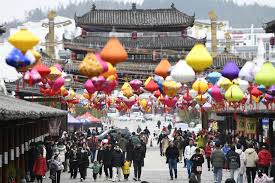
BEIJING, Apr. 14 (INP): Khunjerab Pass reopening will bring great prosperity, said Ajmal Khan, Vice President Gilgit-Baltistan Chamber Of Commerce, in an interview with China Economic Net (CEN).
“Khunjerab Pass is a great blessing for the people of Gilgit-Baltistan because this is where trade takes place. There is no industry here. People here are either employed or their employment depends on trade across the border,” said Ajmal Khan.
The Khunjerab Pass, the only official crossing between China and Pakistan, resumed two way passenger traffic on April 3. Connecting Gilgit-Baltistan with China’s Xinjiang Uygur Autonomous Region, it was shuttered in 2020 to contain the spread of COVID-19 pandemic.
Before COVID-19, exports were mainly pine nuts. Pine nuts from Diamer in GB, Bannu in Khyber Pakhtunkhwa used to pass through Khunjerab Pass.
When pine nuts were being exported, about Rs 4-5 billion can be earned, said Imran Ali, President of Gilgit-Baltistan Chamber Of Commerce.
“Currently, the highest demand in China is for cherry from Gilgit-Baltistan. Cherry of Gilgit-Baltistan is considered to be the best quality cherry in the world,” said Imran Ali.
“The cherry of Gilgit-Baltistan ranks 7th in the world. It is flavorful, delicious and of good quality. When it is exported, we will get yuan or dollars from there,” said Ajmal Khan.
Apart from this, walnuts are exported from Gilgit-Baltistan, and also seasonal fruits that come from Punjab like mangoes. Earlier rice has been exported as well, Ajmal Khan added.
However, Khunjerab Pass lacks facilities for some exports. Due to hot water treatment and certification, Pakistan faces a lot of export difficulties despite demand for dry fruits and fresh fruits from China, Imran Ali pointed out.
Pakistan has two projects running close to Khunjerab Pass. One project is Diamer-Bhasha Dam, which requires heavy machinery. For CPEC mega projects, machinery is brought by sea which takes two and a half months.
However, it takes them 10-15 days only to get their equipment to the project site through Khunjerab Pass, said Imran Ali.
In addition, Imran Ali told CEN that bus service is important because passengers can fit more in the bus as the luggage they carry with them is in the form of bags. Since there is space in the bus, local traders can bring with them small merchandise in the form of bags in the bus.
Moreover, tourists also come and go in both directions by bus, and there are more people going in the bus, so bus service is necessary.
“As gateway of CPEC is Gilgit-Baltistan, road here needs to be widened and a tunnel needs to be built. Due to such hindrance, our import and export is less than other ports. About Rs 6-7 billion worth of goods is traded annually through this border, “said Imran Ali.
At roughly 16,000 feet above sea level, Khunjerab Pass is one of the highest border crossings in the world. “Pakistani government should build tunnels.
If the tunnels are built, traffic will be available twelve months of a year. If not twelve months, at least from the 1st of March to the 30th of December, we can trade comfortably,” said Ajmal Khan.


































































































